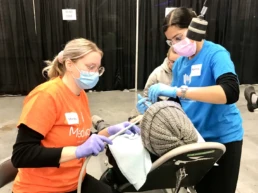
Opening the door to care
Access to specialized oral health care is hard to come by for those who have an intellectual or developmental disability (IDD), and it falls on many groups to fix.
Patients may not be able to fit in a standard dental chair, can develop anxiety from dental tools or are unable to keep their mouths open for long periods of time.
At Delta Dental of Michigan, Ohio, and Indiana we see it as our responsibility to make inclusive and covered dental visits more accessible to all families.
In 2021 we launched the Special Health Care Needs Benefit with the Delta Dental Foundation serving as a key partner.
The benefit allows eligible children and adults with special health care needs access to the benefit should their employer opt in.
Benefits include additional visits to the dentist’s office that can help patients learn what to expect; additional cleanings; and extra care and modifications for patients with sensory sensitivities, behavioral challenges, severe anxiety or other barriers to treatment.
For Indiana mom Erica Deathe, having this benefit would be a game changer.
Her 10-year-old daughter Mallory has cerebral palsy and sees the dentist every six months. With a strong gag reflex and a history of seizures, she has trouble sitting still, especially in the dental chair.
“The older she gets the harder it is (to see the dentist) because she’s more aware of her surroundings and what’s going on,” Deathe said. “I wouldn’t want the procedure or experience to be done in a way that is going to traumatize her.”
And Mallory’s not alone.
For the 6.5 million people in the U.S. with an IDD, seeing the dentist can be overwhelming. Dentists are not always provided the training, tools or time to care for patients with an IDD, who may require special accommodations.
The situation is compounded even more when a patient finds an equipped provider, only to find special services needed are not covered by dental insurance.
“Delta Dental has listened to the pleas of families and caregivers in trying to reduce barriers to care for this most medically and mentally underserved population,” said Dr. Steven Perlman, global clinical director and founder of Special Olympics Special Smiles.
“Access to and the ability to receive quality oral health care is the number one problem faced by children and adults with physical and intellectual disabilities.”
As part of the Delta Dental Foundation’s charitable efforts, to help oral health professionals better care for those with special health care needs, the Foundation sponsored a free continuing education series through Penn Dental Medicine. Dentists completing the courses will receive Disabilities Dentistry Clinician Expert designation and will be better prepared to serve this population.
“We have been engaged in this space for years, working to make oral health care accessible and equitable to all. Now, we are pushing other dental benefit companies to follow suit. Providing excellent coverage that meets all patient needs is the right thing to do,” said President and CEO Goran Jurkovic.









